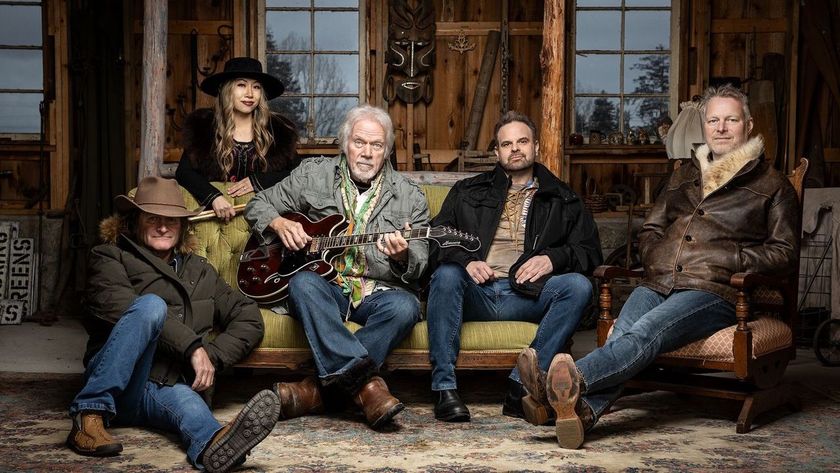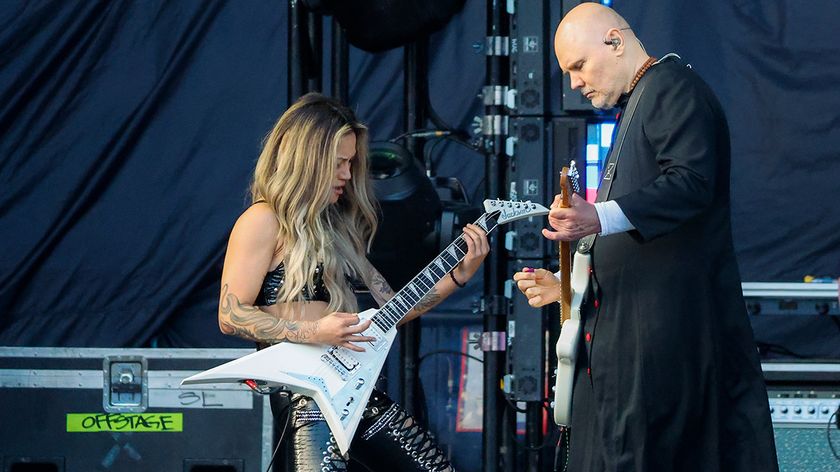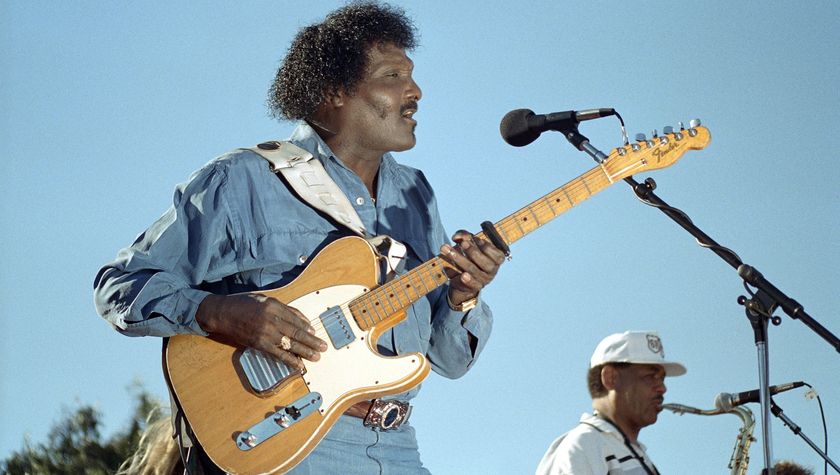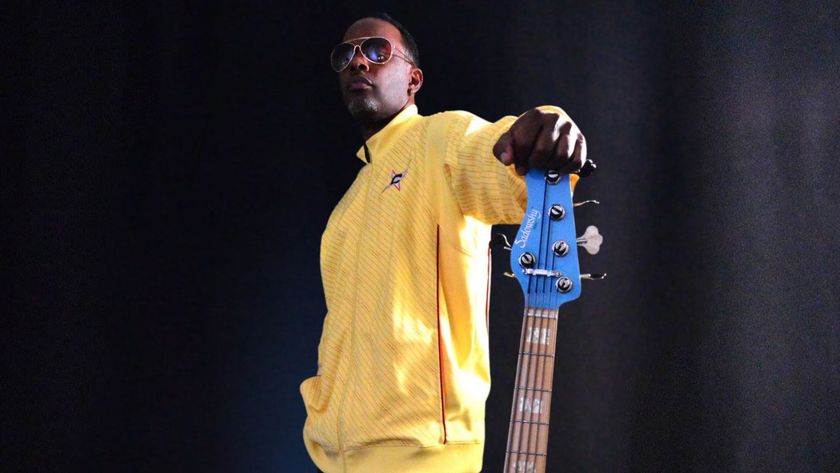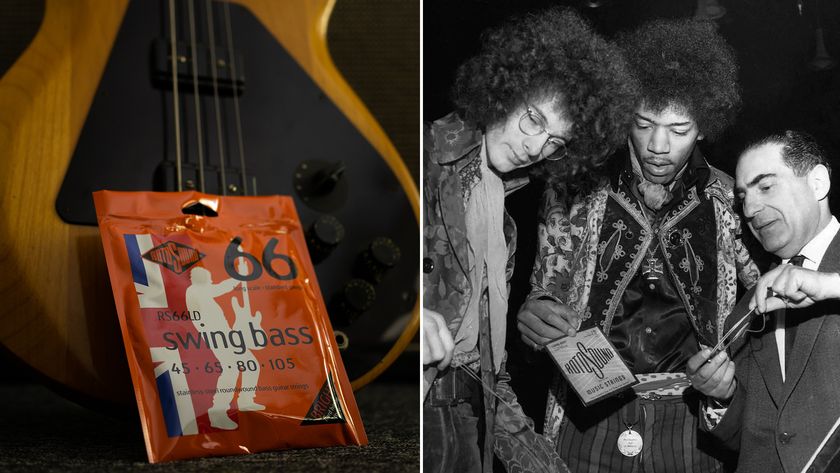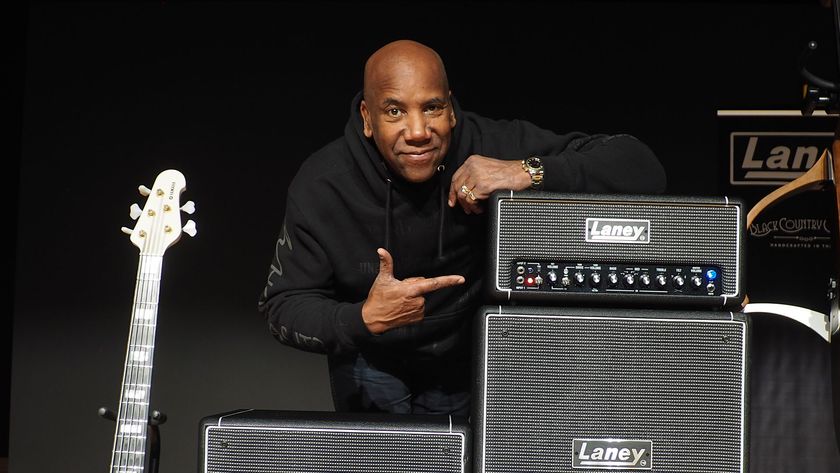Interview: Jeff Tweedy and Nels Cline Discuss the Guitars and Gear Behind Wilco's Latest Album, 'The Whole Love'
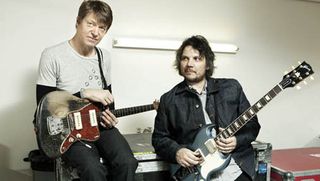
More than a decade and a half has passed since Jeff Tweedy formed Wilco from the ashes of alt-country pioneers Uncle Tupelo.
In that time, the group has risen to become one of the most revered acts in current popular music, mining a singular sound that is simultaneously anchored in a rootsy approach and meandering along rock's outer sonic limits.
Though they began life as a superior Americana-steeped unit, as heard on their 1995 debut, A.M., Wilco have become much harder to define over the years. On albums such as 2004's A Ghost Is Born, the band incorporated expansive guitar and synth workouts into the mix, while the textured sonic excursions heard on 2002's Yankee Hotel Foxtrot had them tagged by some as the "American Radiohead" and got them dropped from Reprise, which at the time was their label.
As Wilco's sound has transformed, so has their personnel. Their lineup has changed frequently, the only constants being singer, songwriter and guitarist Tweedy and bassist John Stirratt. Yet, the band has for its past three albums -- 2007's Sky Blue Sky, 2009's Wilco (The Album) and 2011’s The Whole Love -- solidified around a roster that finds Tweedy more than ably assisted by two guitarists: Pat Sansone, who also contributes keyboards and other instruments, and lead guitarist Nels Cline, whose work over the course of a 30-year career runs the gamut from rock to country to jazz to all manner of avant-garde musical projects.
A virtuosic, versatile and incredibly prolific player – his recorded appearances as a solo artist, band member and collaborator numbers in the hundreds -- Cline is among the most capable and inventive guitarists going. Admits Tweedy, "Nels is a pretty incredible musician to get to hang around with. It's always a learning experience playing with him."
Despite his often experimentalist leanings, Cline hardly views Wilco as a traditional outfit. "Wilco is a very free band in the sense that we don't have to do anything we don't want to do," the guitarist says. "Jeff doesn't have anybody telling him he has to stick with one thing; he doesn't have a hit he has to play every night, and he's not considered part of just one decade. There's not a lot shackling the band. If we want to shift direction, we can just do it."
On The Whole Love -- Wilco's first release under their newly formed imprint, dBpm – they indeed try out a myriad of styles, from organ-drenched rave-ups ("I Might" and "Standing 0") to slightly skewed honky-tonk ("Capitol City") to buoyant pop-rockers ("The Whole Love" and "Born Alone").
Get The Pick Newsletter
All the latest guitar news, interviews, lessons, reviews, deals and more, direct to your inbox!
Then there are the two tracks that bookend the record: the closing "One Sunday Morning (Song for Jane Smiley's Boyfriend)," whose subtle sonic pleasures unfurl slowly over 12-plus minutes, and the opener, "Art of Almost," which piles on all manner of seemingly disjointed instrumentation -- stuttering drums, burbling synths, swelling orchestral strings -- before exploding into a double-time instrumental coda topped by a frenetic Cline solo, a high-point guitar moment on an album that holds many such instances.
Tweedy and Cline recently sat down with Guitar World to delve into some of the finer aspects of their own -- and each other's – guitar playing. They also took time to discuss their extensive gear collections, the considerations of playing in a three-guitar band and some of the music on The Whole Love.
The new album, Tweedy says, is their "best one yet." But, he adds with a laugh, "I always feel like the one we just did is the best one. Truthfully, I really wouldn't want to make a record where I didn't feel that way."
GUITAR WORLD: Jeff, you've said in the past that you primarily write on acoustic guitar. Was that the case as well for The Whole Love?
JEFF TWEEDY: Yes. It's really the only instrument that I have any kind of ... I wouldn't say mastery of, but I've certainly been playing it long enough that I'm conversant with it in a way where I'm able to go to what I hear in my head pretty quickly. As a writing tool there's no point in me using anything other than an acoustic unless I'm wanting to shake myself out of some kind of rut and play something where I have no idea what's happening. [laughs]
When you work the songs up into full band arrangements, is it ever a challenge to find space for three guitars?
TWEEDY: Not really. I think that everybody in Wilco has made enough records and is sensitive enough as a musician to know how to not step on each other's toes. There isn't a lot of fighting over frequencies in Wilco. We tend to stake out our territory, and it usually doesn't require a whole lot of discussion.
What would you say are Nels' and Pat's particular strengths as guitarists?
TWEEDY: They're very different players. Pat is very much a classicist and can really emulate a lot of styles, not just from rock and roll but across the board. Nels is obviously virtuosic on his instrument but is more interested in just going for it. He wants to find textures that are very unique and very personalized. And I think the two complement each other perfectly. With Pat, it's really helpful to have somebody who's just able to immediately go to the thing that everybody is hearing. I also think it's very helpful to have someone like Nels, who will push it to another place. And I'm very happy living between those two points.
Nels, what do you see as your role in the band?
NELS CLINE: I feel like my role is to play what the song wants. I came into Wilco to try to fit into an orchestral vision of a band, not to be a hot soloist or anything like that. When I'm asked to solo it's sometimes a challenge for me to play a 10- or 20-second pop-song thing, because I tend to like to wind things out for a long time; I'm more comfortable with the long form, shall we say. [laughs] But in general I'm just trying to play something that makes the song sound beautiful or recognizable or powerful, or whatever these things might be.
Sometimes that involves adding things like looping and distortion and other elements that are maybe newer aspects of the Wilco sound. But that's certainly not an attempt on my part to change the sound of the band at all. Those things come naturally to me, and everybody has seemed to embrace them in their own way.
Given your musical resume, people tend to assume that those "newer aspects" of the Wilco sound are largely of your doing.
CLINE: Well, in truth, despite what people may think, I rarely take an unobvious or unexpected approach to these songs. I usually play it pretty straight at first. I think people suspect I'm the guy that always wants to take things further out, but I'm not. If there's something that needs to be added that's beyond the nature of the song, it's usually up to Jeff to drag it out of me.
On the new record, the most obvious moment where you take it further out would be the solo at the end of the first track, "Art of Almost."
CLINE: For that one, Jeff just turned to me and said, "Okay, man, shred! This is it!" [laughs] There's sort of a rough tone and rough phrasing on it, which is not the first thing I would do on a song. But one of the things Jeff has said to me on occasion is to play as though I had two of my fingers tied together; in other words, not just more slowly but also sometimes with less finesse. And I'm comfortable taking this kind of direction and going with it.
TWEEDY: We worked really hard to get the shape of the rave-up, or the freak-out section -- whatever you want to call it -- at the end. And then we let Nels have some go's at it. But to be honest, Nels really wants a lot of direction. Maybe it's because he can fucking play anything, so it's helpful for him if you steer him a little bit.
And in the case of "Art of Almost," he was doing a lot of passes where he was using a lot of his sound effects and toys, and I think at some point we just kind of gave him one pedal and said, "You can use this one and that's it. Do what you can do with just this pedal ... and maybe this one." [laughs] And he pretty much just nailed it. I could practice for 100 years and I wouldn't be able to play that solo.
Nels, you're known for being a big pedal guy. What were some of the main ones this time around?
CLINE: I had a lot of my usual Wilco pedals, which are the [DigiTech] Whammy, the Fulltone '69, the Klon Centaur, the [Crowther Audio] Hotcake, the Z.Vex Fuzz Factory and Box of Metal, the Jam Pedals Rattler, the original Electro-Harmonix 16-Second Digital Delay and the Deluxe Memory Man, the Korg KP2 KAOSS Pad, and an old Boss VB-2 Vibrato and a DD-3 Digital Delay. A few others that I really liked and that I know I used this time were some of the DeviEver pedals, like the Hyperion and the Soda Meiser, which are great.
What guitars and amps did each of you use on The Whole Love?
CLINE: My go-to guitar is my '59 Jazzmaster; it's my number one, and it looks like it's been through a war. I guess it has been through my own personal war. That's the guitar on the "Almost" solo. I joke with Jeff that I'm not really sure why I own any guitars other than Jazzmasters, because I'm never really unhappy playing one; I can pretty much get any sound I want out of it.
But I also used a bunch of other things: a Hopf Telstar, which is also on "Almost," as well as "Capital City" and "Dawned On Me"; a Jerry Jones Shorthorn three-pickup, which is on "Sunday Morning"; and a Jerry Jones Neptune 12-string, which you can hear on "Sunloathe." I also had my faded Gibson double-cutaway Les Paul with P-90s that Jeff gave me when I first joined the band -- I think I used that for "I Might." Then there's also a National Lap Steel, a Jerry Jones doubleneck baritone and some others.
For amps, most of my parts were tracked with either my 15-watt Magnatone or my custom Schroeder, which is a variation on their DB7, but with more wattage, and was built for me by Tim Schroeder. I also used a small Kalamazoo amp that belongs to John [Stirratt] that was something like five watts. It has this extremely thin, serrated tone that I liked to use for overdubs.
TWEEDY: I have a 1965 SG, which is pretty much my main guitar. I also used an Epiphone Wilshire, the mini-humbucker model, a little bit. Those were my two main electrics, but I have so many guitars. I've been buying them forever. I did a few overdubs here and there with a Rickenbacker 330, and also some with a Tele. But for the most part, almost everything is on the SG.
For the acoustic parts I primarily played a Fifties Gibson J -200. I actually have two of them that are almost identical -- both have double pickguards and a name on the top pickguard. One says "Bob" and one says "Buck." And I bought them years apart, so it's kind of strange! And then for amps, I almost always use tiny little Supros or Valcos in the studio. I keep them fairly clean but right on the edge, where they're about to break up. I've been on a Valco kick for a while now. I have a bunch of them, but I don't know the model numbers of any of them. I'm kind of a gear whore, but I'm not a very attention-to-detail gear whore. [laughs]
Jeff, earlier on in Wilco, particularly on A Ghost Is Born, you played significantly more lead guitar. Has your role as a guitarist changed over the last few albums?
TWEEDY: Well, for one thing I don't have to worry about it nearly as much. I can focus much more on the songwriting and the singing and the lyrics and all of that stuff. Because when you have not just one but two guitar players who are way better than you are, I think you should probably let them play more in your band. But there was a time where it was really necessary and even exciting for me to explore that for myself -- on Ghost in particular, and even before that. A lot of the solos on the earlier Wilco records are me. But I think I took it as far as I could go, though Nels is always prodding me to play more guitar and step out more, because he claims to really like my sort of skronky, primitive style. [laughs]
And I'm sure that it will come back around. In my experience, things are cyclical, and at some point I'm really gonna get turned on by the guitar again and want to make a record that's a full-on skronk-fest, with me, Nels and Pat doing the triple-guitar attack. But I don't worry about it that much.
Nels, as someone who is continually taking part in diverse projects with a wide range of musicians, what does being a member of Wilco offer you as a player?
- CLINE: For starters, certainly it's a challenge for me to fit into some of the songs and be part of the so-called orchestra. But I find that satisfyil}g, because I enjoy playing what I might term "potentially classic" songs. Periodically, I step back and say, Wow, I'm participating in something that I think really holds up in the annals of songwriting and rock and roll. And that's a great thing.
- Another thing the band offers is what I call being in the "deluxe clubhouse," which is that we get to travel with a lot of beautiful guitars, and I'm able to choose guitars onstage based on my tonal needs, rather than trying to get every possible sound out of one guitar. I'm not usually able to travel at that level playing my own music, because what I normally do is so far from what you might call "popular music."
And another thing- and I'm not trying to be irreverent by saying this-is that I enjoy the whole pageantry involved in being part of a big rock show. And I don't necessarily mean playing to big crowds, but rather that I like all the production aspects of what we do-I like the lighting and all that shtff. I'm not averse to it. In fact, I kind of dig it. [laughs]
But overall, what's really fun about Wilco is its versatility. Jeff's a really good player. Pat's a really good player. So there's a lot of possibilities just on the guitar end, which is only part of it. There's a real "music for music's sake" atmosphere in this band. We want to transport people. Because it's a beautiful thing to be able to have music take you somewhere. That's what I live for, and that's what we live for.
Photo: Justin Borucki



















Rich is the co-author of the best-selling Nöthin' But a Good Time: The Uncensored History of the '80s Hard Rock Explosion. He is also a recording and performing musician, and a former editor of Guitar World magazine and executive editor of Guitar Aficionado magazine. He has authored several additional books, among them Kurt Cobain: Montage of Heck, the companion to the documentary of the same name.

